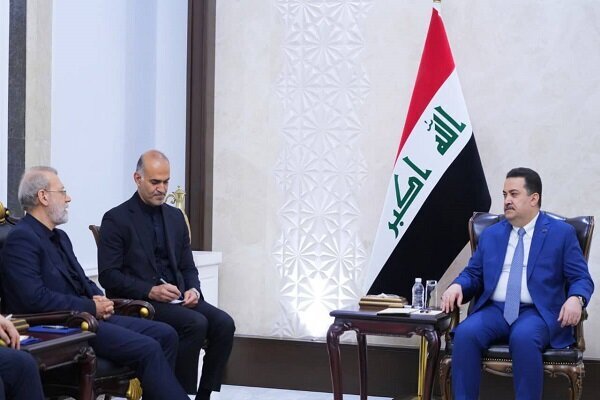Iran, Iraq; strategic allies, pillars of regional stability

TEHRAN, Aug. 16 (MNA) – The signing of a new security agreement between Tehran and Baghdad will not only strengthen bilateral cooperation but will be seriously effective in solidifying regional stability and security.
The Islamic Republic of Iran has still a powerful presence in the region, and after the 12-day Israeli-imposed war, the country's regional sphere of power has not only not been limited, but also has expanded. Choosing Iraq as the first destination for Ali Larijani, the new Secretary of Iran’s Supreme National Security Council (SNSC), is a clear sign of the importance of the relations between the two countries, especially in a situation where Baghdad was also the first foreign trip of Iranian President Masoud Pezeshkian. This is a clear sign that Iraq remains Tehran's strategic priority.
Iraq, thanks to Iran's extensive cooperation in the post-Saddam era, has been able to overcome internal chaos, occupation, terrorist attacks, and infrastructure problems. In describing this situation, it should be said that the Islamic Republic of Iran, as the most important supporter in saving Iraq from terrorist attacks and ensuring the country's internal stability and security, has now placed its neighbor in a position where it has been promoted from a country in need of an effective and important security economic partner. As a result, a grand and magnificent ritual such as the million-strong Arbaeen procession, under the shadow of ensuring security and mutual cooperation, proceeds without obstacles and challenges.
Iran and Iraq, together, are the main pillars of the regional security, not only because of their 1,458-kilometer common border, but also because the history of cooperation over the past two decades has created an accumulation of mutual understanding and efforts to protect their interests. The two countries have such a significant security role in their important geographical area that their stability directly affects the security of energy routes, trade corridors, and supply lines and supply chains. They jointly control huge oil and gas reserves; Iraq in Basra and Kirkuk, Iran in Khuzestan and offshore fields. A coordinated energy policy could change OPEC dynamics and regional pricing strategies.
Agreements to maintain mutual security
Over the past years, the development of relations between Iran and Iraq has encompassed all political, economic, social and cultural fields. Undoubtedly, in addition to the historical and cultural backgrounds and the brotherhood between the Muslim peoples of the two countries, there is another factor for the development of bilateral relations, which is maintaining security. The culmination of security cooperation between Iran and Iraq over the past years date back to the signing of the agreement on March 19, 2023, which was signed between Ali Shamkhani, the then Secretary of Iran’s Supreme National Security Council, and Iraqi National Security Advisor Qasim al-Araji.
The main priority and focus of that agreement was “preventing Iraq from being used as a base for hostile and counter-Islamic revolution groups, especially in Iraqi Kurdistan.” In addition to political and security officials and institutions, the armed forces also seriously took action to implement this agreement, and bilateral cooperation resulted in the counter-revolutionary groups being kept away from the border areas of the Islamic Republic of Iran and their camps and headquarters being evacuated.
The achievement of this long-term cooperation is reaching a point called a common security understanding. This is why Iraqi top security official Al-Araji has openly stated that “Iran and Iraq’s security are intertwined, and for this reason, Baghdad is willing to implement the previous security agreement while at the same time being prepared for new agreements.” Spokesperson for Iraq's Joint Operations Command Major General Tahsin al-Khafaji, has also said that Iraq is fully committed to implementing the security agreement. Therefore, the necessary measures are being taken to prevent the use of Iraqi soil to attack its neighbors.” The Iran-Iraq security agreement reflects a strategic alignment in maintaining regional stability, securing borders, and confronting terrorism. Despite the implementation challenges, Iraq has always considered this cooperation necessary and beneficial for both sides.
A review of field evidence indicates that Iraqi central government has demonstrated a high level of commitment to the agreement and security cooperation with Iran, but in practice, challenges have been observed in implementing the agreement, which are related to the internal inadequacies and inconsistencies of the Iraqi Kurdistan Region. One of the most important criticisms of Iran in this regard is the failure to provide the basis for the disarmament of all hostile groups.
US failure to create a rift between Tehran and Baghdad
Over the past two decades, the Islamic Republic of Iran has always had and continues to have continuous contact with all political groups and currents in Iraq. This is while the United States has openly tried many times to distance all political currents and executive institutions in Iraq from Iran by using various tricks. However, such a situation has not yet occurred. At the juncture of internal political disputes, Iraqi leaders have asked Iranian officials to act as mediators and advisors, given their goodwill and fraternal view of all groups.
Iraq has now found significant capacities for political mediation in the region, and using this significant capacity has made valuable achievements in Tehran-Baghdad relations, and now, from the Persian Gulf to the Arab League and other regions, the Iraqi diplomatic apparatus is a reference for diplomatic consultation and presenting an accurate and fair picture of the foreign policy goals of the Islamic Republic of Iran. As a result, the United States and the Zionist regime are naturally looking for opportunities to take away the possibility of diplomatic and security cooperation from these two influential and effective actors in the region, but evidence has shown that Tehran and Baghdad are too cautious to give such an opportunity to their enemies.





